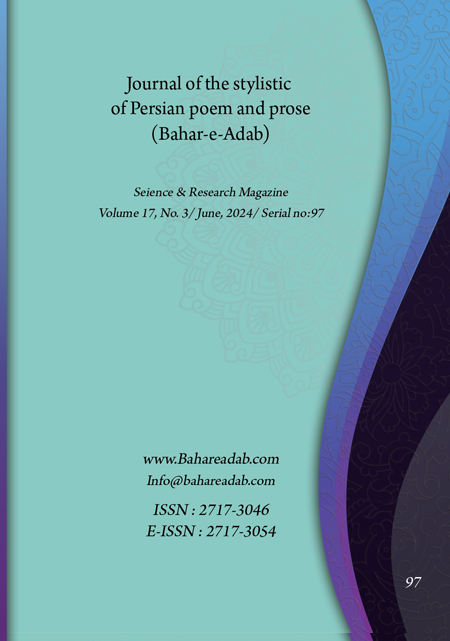- Count View : 413
- آدرس کوتاه شده مقاله: https://bahareadab.com/article_id/1645
- کد DOI مقاله: DOI:10.22034/bahareadab.2024 .17 .7366
Journal of the stylistic of Persian poem and prose
volume Number 17،
number In Volume 3،
،
issue Number 97
An analytical look at the origins of linguistic archaism in Bahman Salehi's poetry
Hossein Karimi Sabet , Seifuddin Abbarin (Author in Charge), Forogh Jalili
Abstract
BACKGROUND AND OBJECTIVES: Linguistic archaism or archaism is one of the types of language deviation which is the factor of distinguishing and highlighting the language of poetry. Even though contemporary poetry is trying to get closer to the language of speech and the living language of the day, with all these different causes and reasons such as the influence of tradition, musical necessity, rhyming, verbal and spiritual originality, etc. Archaism in the language of contemporary poetry. Bahman Salehi is also one of the poets who chooses the language of time in his poetry and has a contemporary language, however, his poetry is not devoid of linguistic archaism, and in the poetry of this contemporary poet, there are reasons such as the influence of the language of traditional poetry, musical, rhetorical and semantic factors, the necessity of rhyme., verbal and spiritual originality and some other factors of linguistic archaism.
METHODOLOGY: The current research is a basic and applied research. The work method is analytical-descriptive and the method of collecting information is library.
FINDINGS: The result of the present research shows that Salehi used linguistic archaism for various reasons and that linguistic archaism in his poetry has diverse and multiple origins. He has identified the language of his poetry by using linguistic archaism, and archaism has become the linguistic highlight of his poetry. The influence of tradition, especially the tradition of lyric poetry, is one of the factors that causes archaism in his poetry.
CONCLUSION: The result of the research shows that factors such as the influence of the tradition, especially the tradition of lyric poetry, the requirement of rhyme and music, rhetorical and original verbal and spiritual causes, the meaning and semantic-phonetic characteristics of some archaic words and their preference over contemporary words. The presence of these words in Salehi"s poetry has been the reason.
Keyword
The language of poetry
, archaism
, tradition
, music
, rhyme
, verbal and spiritual originality
, the power of meaning.05 November 2023
- Ahmadi Givi, Hassan and Anuri, Hassan (2000), Persian Grammar (1), Tehran: Fatemi.
- Alipour, Mustafa (1999), The language structure of today's poetry. First Edition. Tehran: Ferdous
- Bahar, Mohammad Taqi (1996), stylistics, 8th edition, Tehran: Amirkabir.
- Basak, Hassan (2013), Seven swords of love (archaism in "Song of Ibrahim in the Fire" by Shamlou), research journal of lyrical literature, volume 12, number 22, serial 22, June 2013, pages 51-68.
- Dehkhoda, Ali Akbar (1998), Dictionary, under the supervision of Mohammad Moin and Seyyed Jafar Shahidi, Tehran: Tehran University Press.
- Esfandiar, Houshmand (2010), Arousan Sokhn. Tehran: Ferdous.
- Geoffrey N. Leech, (1969) A Linguistic Guide to English Poetry (New York:,Longman.
- Hafez Shirazi, Shams al-Din (1987), Diwan Ghazliat, edited by Khalil Khatib Rahbar, 4th edition, Tehran: Safi Alishah Publications.
- Homayi, Jalaluddin (1984), Rhetorical Techniques and Literary Industries, Tehran: Tos.
- Khaqani, Afzaluddin Badil (2003), Diwan, correction and introduction and notes by Ziauddin Sajjadi, Ch 7, Tehran: Zovar.
- Moqdadi, Bahram (1999), Dictionary of Literary Criticism Terms from Plato to the Present Age, Tehran: Fekr Rooz.
- Nafisi, Azar (1989), "Defamiliarization", Kihan Farhangi magazine, second issue, sixth year, May 1368
- Natal Khanleri, Parviz (2012), History of the Persian language, 7th edition, Tehran: New Publishing House.
- Nimayoshij (1984), Neighbor's Words, fifth edition, Tehran: Dina.
- Omid, Hassan (2010), Farhang Farsi Omid, first volume, Tehran: Ashja
- Saadi Shirazi, Sheikh Moslehuddin (1997), Kaliat Saadi, under the care of Mohammad Ali Foroughi, Tehran, Amir Kabir Publishing House.
- Safavi, Koresh (1994), from linguistics to literature, first volume: Nazm, Tehran: Cheshme.
- Salehi, Bahman (2013), Baran Shabana (selection of poems), 2 volumes, Tehran: Surah Mehr Publications.
- Sangri, Mohammad Reza (2012), Non-normative and extra-normative in poetry ("Archaism" archaism), Persian Language and Literature Development Magazine, Spring 2012, Vol. 65, Pages 4-8.
- Shafi'i Kodkani, Mohammad Reza (1991), Imaginary images in Persian poetry, 4th edition, Tehran: Aghah Publications.
- Shafi'i Kodkani, Mohammad Reza (2004), music of poetry, 10th edition, Tehran: Aghaz
- Shafi'i Kodkani, Mohammad Reza (2011), Resurrection of Words, 3rd edition, Tehran: Sokhn.

